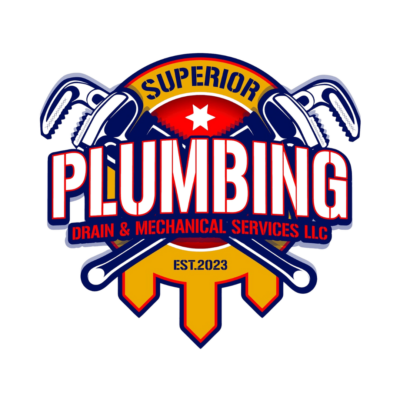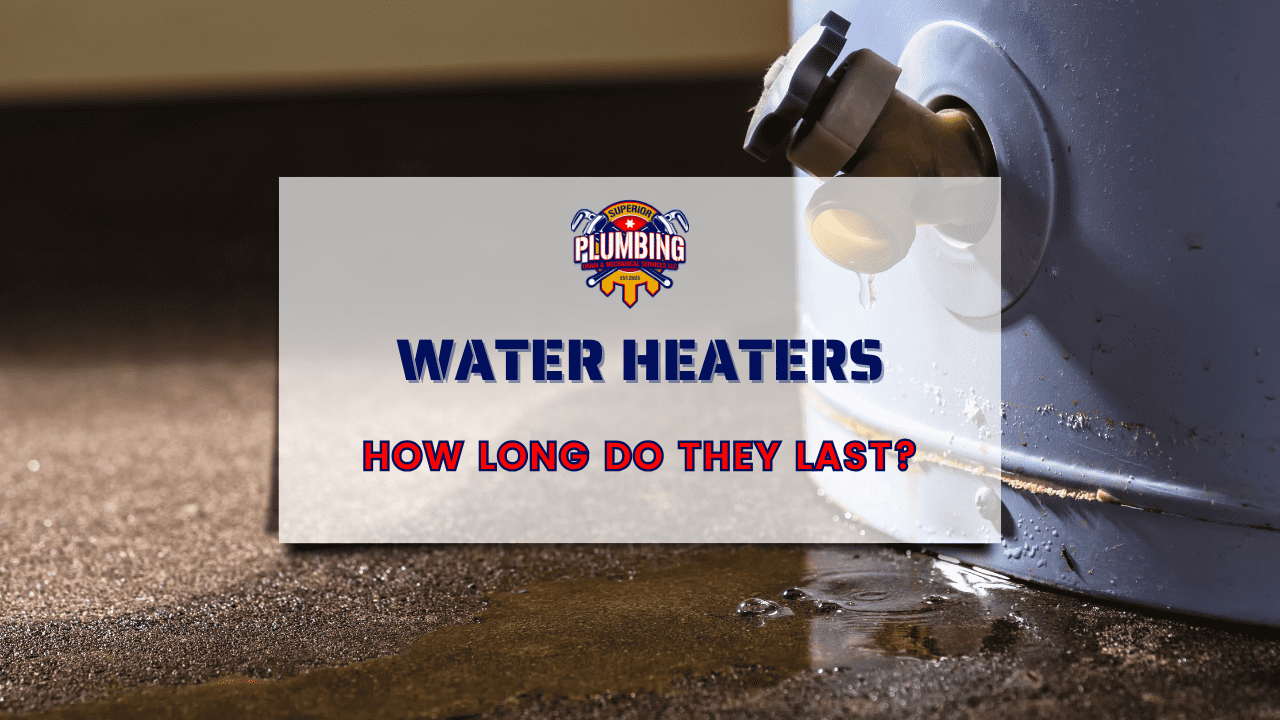Key Takeaways
- Average Water Heater Lifespan: Most water heaters last between 8 to 20 years depending on the type.
- Factors Affecting Lifespan: Water quality, the condition of parts and more can affect how long a unit lasts.
- Schedule Water Heater Service: Superior Plumbing of Tulsa provides professional water heater maintenance, repair & replacement.
Is your water heater starting to show its age? Water heaters, like all appliances, have a limited lifespan. Understanding how long your water heater should last can help you plan for potential replacements and avoid unexpected breakdowns. Today, we’ll cover the factors that influence a water heater’s life span and provide tips on extending it.
We’ll also go over common signs that your water heater might be nearing the end of its lifespan. We have money saving tips for seasoned homeowners and first time buyers.
Contact Superior Plumbing today to schedule a water heater inspection and ensure your home’s comfort.
How Long Does a Hot Water Heater Last?
The average lifespan of a water heater is between 8 to 12 years. However, many factors affect your water heater’s life expectancy. The quality of the unit, its water quality, usage frequency and maintenance all play impactful roles.
Factors like hard water, frequent temperature fluctuations, and lack of regular maintenance can shorten its lifespan. By understanding these factors and taking proactive steps, you can maximize the life of your hot water heater.
Factors Affecting Lifespan
A water heater’s age is far from the only factor in how long it will last. Water quality, the condition of its parts and water pressure all affect your units lifespan.
2 forms of water quality exist, which include hard water and soft water. Hard water has high levels of minerals. These minerals can lead to scale buildup inside the tank, reducing how well and long it lasts. Regular maintenance and flushing can help mitigate the effects of hard water.
In case you don’t know, an anode rod is a sacrificial metal rod located inside the tank. It helps protect the tank from corrosion. Replacing your anode rod every 3 – 5 years can extend your unit’s life by many years. In fact, your water heater can last decades by changing out its anode rod on time.
Water pressure and recirculation pumps can also impact the longevity of your water heater. High water pressure can put additional stress on the tank and its components. A recirculation pump can lead to increased wear and tear due to high heat. You can help prolong the life of your water heater by addressing high water pressure and avoiding the use of pumps.
Factors Affecting Water Heater Lifespan
- Water Quality: Hard water corrodes units faster than soft water
- Anode Rod Condition: This part protects your water heater from corrosion
- Water Pressure: High pressures above 80 psi stress the water heater tank
- Recirculation Pumps: Constantly circulating hot water wears out components
- Maintenance: Flushing your tank and checking its parts keeps it in good condition
Schedule hot water heater maintenance with Superior Plumbing of Tulsa. Let us keep your unit in tip-top condition to last as long as possible.
How to Make My Water Heater Last Longer?
You can make your water heater last longer using the following steps. One easy way to extend the life of your unit is by flushing out the tank regularly. Flushing the tank removes sediment allowing it to heat water better and avoid damage.
Replacing the anode rod every 3 to 5 years is another life extending tip. This part prevents minerals from eating away at the inside of your tank.
Installing a water softener can extend the life of your water heater. This tip works by reducing the minerals that corrode the tank.
These are just a few ways in which you can extend the life of your water heater. Maintenance from a licensed plumber covers all these bases and more.
Signs of a Bad Water Heater
Discolored water is one of the most obvious signs of a failing water heater. Have you noticed your water turning yellow, brown or red? This could be a sign of sediment buildup or corrosion in the bottom of tank. This can compromise the water quality and affect the overall performance of your water heater.
Additionally, a lack of hot water is a clear indication of a problem. This could be due to a faulty water heating element or thermostat. Other signs to watch out for include water leaks, foul odors and high energy bills.
If you notice any of these issues, address them promptly to avoid more damage and costly repairs. Regular maintenance can help prevent these problems and extend the life of your water heater. Take advantage of our free estimates for plumbing service.
Symptoms of a Hot Water Heater Going Out
- Rusty Water: Discolored water can indicate corrosion within the tank
- No Hot Water: A complete lack of hot water is a clear sign of a bad heating element
- Age: Water heaters typically last 8-12 years. If yours is older, it may be nearing the end of its lifespan
- Water Leak: Visible water leaks around the tank or pipes are a serious issue that requires immediate attention
- Foul Smell: A sulfurous odor from the water can indicate a problem with the anode rod or sediment buildup
- High Energy Bills: A sudden rise in energy costs may signal a less efficient water heater
- Odd Noises: Unusual sounds, like popping or banging, can indicate internal issues
Water Heater Repair and Replacement
It may be time to repair or replace your water heater. If any of the signs above apply to your unit, contact a licensed plumber for guidance.
A repair may be enough for minor issues. This is usually the case for newer hot water tanks.
However, if your water heater is older, a replacement might be the best option. This is usually the case if it breaks down frequently.
Don’t let a bad water heater give you a bad day. Contact Superior Plumbing today to schedule a water heater repair or replacement.
Water Heater Installation in Tulsa
We understand that a broken water heater can disrupt your life and cause a huge inconvenience. Nearly 90% of installations take place as an emergency. That’s why Superior Plumbing of Tulsa offers fast and reliable water heater installation services.
Schedule water heater installation service with us today! Our team of licensed plumbers will get your hot water running again. Let us provide you with the comfort and convenience you deserve.
Frequently Asked Questions
What signs indicate that you should replace a hot water heater?
Consistent leaks, rusty water and frequent breakdowns, are signs that you need a new water heater. Additionally, if your water heater is over 10 years old, it might be nearing the end of its lifespan.
Can a hot water heater have a 20-year lifespan?
Yes, with proper maintenance and ideal conditions, a water heater can potentially last 20 years or more. However, factors like water quality, usage frequency and local climate can influence its lifespan.
Should I replace my 15-year-old water heater?
If your 15-year-old water heater is not working very well, it’s likely time for a replacement. A newer, more energy-efficient model can save you money on utility bills and improve your home’s comfort.
What is the lifespan of a 50-gallon water heater?
A 50-gallon water heater typically has a lifespan of 8 to 12 years. However, with proper maintenance and favorable conditions, it can last longer.
How long does an electric water heater last?
Electric water heaters generally have a similar lifespan to gas water heaters, ranging from 8 to 12 years.
How long can a tankless water heater last?
Tankless water heaters may last around 15 to 20 years. Corrosion and sediment buildup from water often leads to traditional tank water heater failure. Tankless water heaters avoid these issues.


Leave a Reply